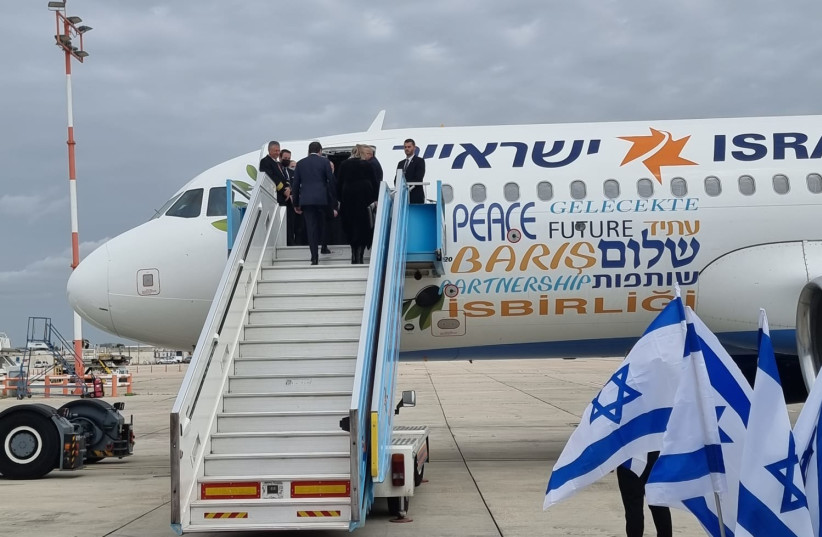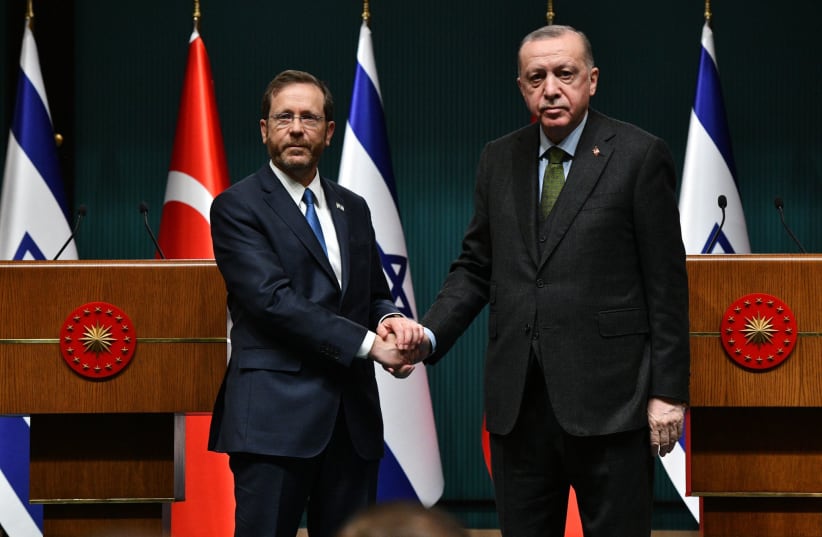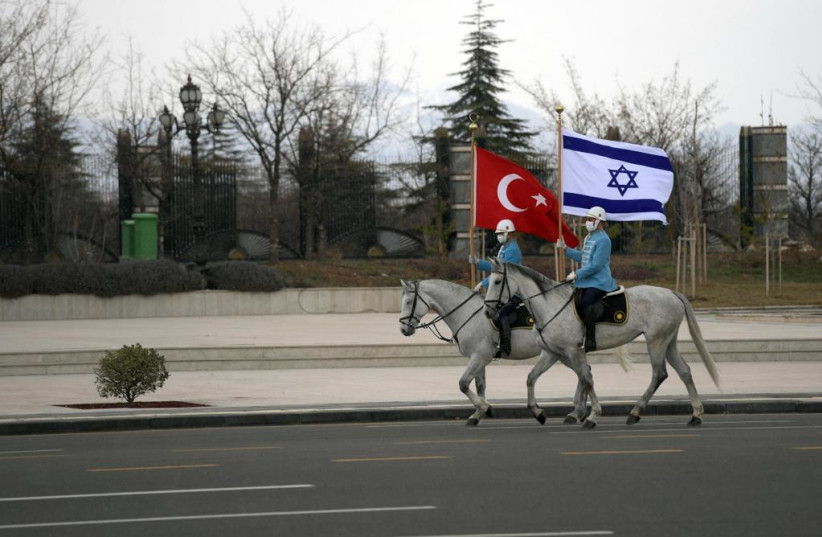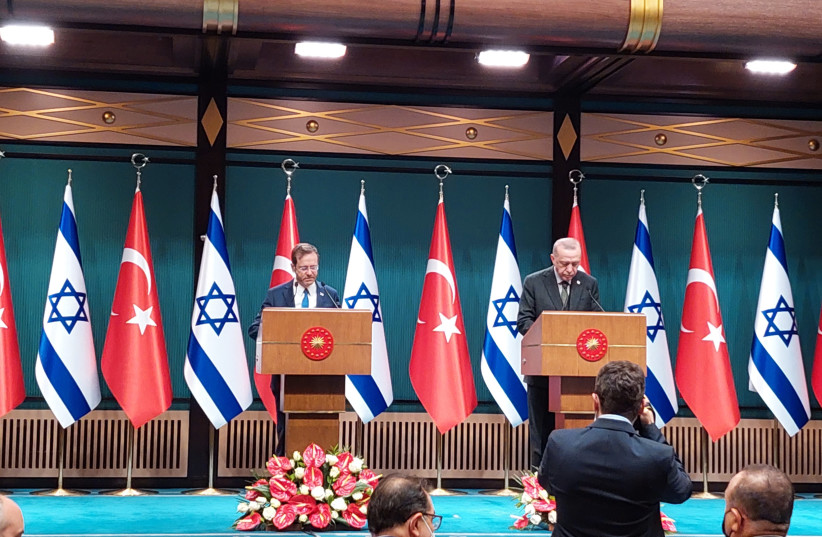ANKARA – President Isaac Herzog became the first Israeli leader to visit Turkey in over a decade on Wednesday, marking a thaw in relations between the countries.
Turkish Foreign Minister Mevlut Cavusoglu said Ankara and Jerusalem are working toward exchanging ambassadors for the first time since 2018, which would mark the resumption of full normalization. Toward that end, Cavusoglu plans to visit Israel and meet with Foreign Minister Yair Lapid in April. The Foreign Ministry in Jerusalem said the trip has not been finalized.
Another major result of Herzog’s meeting is that the sides agreed to establish a mechanism by which to work out disagreements, rather than the repeated withdrawals of ambassadors as Erdogan did when he opposed Israeli actions towards the Palestinians.
Herzog was greeted at the palace of Turkish President Recep Tayyip Erdogan by the playing of “Hatikvah” and a 21-gun salute. “Hatikva” is the Israel national anthem and Hebrew for “The Hope.”
Hatikva and a 21-gun salute for Israeli President @Isaac_Herzog outside Erdogan's Presidential Palace pic.twitter.com/nxamAC5QCq
— Lahav Harkov (@LahavHarkov) March 9, 2022
Under a light dusting of snow, the presidents inspected a long honor guard of soldiers in sky-blue dress uniforms with bayonets, standing along a matching carpet. In addition, a line of sword-bearing soldiers in historic uniforms and armor waited outside Erdogan’s colossal Presidential Palace, which has over 1,000 rooms.

Erdogan called Herzog’s “historic visit” a “turning point in ties between Turkey and Israel.”
“Our shared goal is to revive the political dialogue based on shared interests with respect to mutual sensitivities,” he said. “Developing relations between Turkey and Israel is of great value for our countries and stability and peace in the region. We are able to contribute to a culture of peace and coexistence in our region.”
In addition, the Turkish president said, improved bilateral relations will make it easier to handle “controversial issues.”
The Palestinians were a central topic in the meeting, according to Erdogan, who said he “expressed the importance we saw in reducing tensions in the region and preserving the vision of a two-state solution... [as well as] the status of Jerusalem and preserving the historic nature and holiness of al-Aqsa,” mosque on the Temple Mount.
Erdogan also called for Israel to allow Turkish organizations to continue humanitarian activities for the Palestinians.
Erdogan said that during the COVID-19 pandemic, trade between Turkey and Israel grew, reaching $8.5 billion and he expressed hope it will grow to $10b. this year.
In addition, Erdogan suggested Israel and Turkey cooperate in the field of energy.
Israel cooperates with Greece and Cyprus – Turkey’s historic adversaries in that field – and Herzog visited Athens and Nicosia in recent weeks to reassure them that improved ties with Ankara will not hurt their relationship. Herzog referred in his remarks to his recent visits to Greece and Cyprus and that he remains in constant contact with their leaders.
The Turkish president called antisemitism “a crime against humanity,” and said Turkey “will continue our determined stance to fight antisemitism, Islamophobia, xenophobia and racism.”
Herzog said he hopes the relations between Israel and Turkey will be characterized “by mutual respect allowing us to deal with the regional and global challenges we share.”
“Israel and Turkey can and must cooperate in many areas that dramatically influence the region that we all call home,” Herzog stated. “We will try to promote a dialogue with actions and mutual respect.”
Herzog said that the problems of the past cannot be ignored, but that Israel and Turkey are trying to move forward.
“We agree that we won’t agree on everything,” he said. “But we will resolve the disputes with mutual respect and honesty... We will look together toward a shared future.”
Herzog also relayed a message of coexistence between Jews and Muslims in the Middle East, saying that the Turkish and Israeli nations are the sons of Abraham.
Among the areas in which Turkey and Israel hope to expand ties are in tourism, economics, energy, security and fighting climate change, the last of which Herzog has strongly emphasized, his spokesman said.
On the tarmac at Ben-Gurion Airport before his departure, Herzog said that “relations with Turkey are important to Israel and the whole region.
“Certainly when world order is shaken,” the president said, referring to Russia’s war on Ukraine, “it is important to maintain stability in our region. I emphasized this in my meetings in Greece and Cyprus.”
“My vision is Jews, Muslims and Christians living in peace in our region in a way that brings prosperity to the region,” Herzog stated. “I hope that after my visit, we will start the process of serious, deep diplomatic discourse to bring advanced ties and positive results.”
דגלי ישראל באנקרה pic.twitter.com/TQceXqxblL
— Itamar Eichner (@itamareichner) March 9, 2022
The official state visit came at Erdogan’s invitation and was the first by an Israeli leader since 2008 and a president since 2007.
Herzog traveled to Istanbul immediately after the meeting with Erdogan, and is scheduled to meet with the Jewish community on Thursday.
Erdogan called Herzog to congratulate him on his election victory last year, which led to a resumed dialogue between their countries after years of disconnect at the higher levels. They have spoken several times since. The Turkish president called for improved ties with Israel several times last year, including in December to the Alliance of Rabbis in Islamic States.
Despite his differences with Israel over finding a solution to the conflict with the Palestinians, Erdogan said relations between Turkey and Israel are essential for the security and stability of the region. Turkey’s change in policy might be related to its declining economy and growing diplomatic isolation, which it has sought to resolve, including through a rapprochement with the United Arab Emirates.
At the same time, Turkey harbors Hamas terrorists, Erdogan has accused Israel of intentionally killing Palestinian children, and state-controlled media outlets have broadcast antisemitic television series. This week, Yigit Bulutt, Erdogan’s chief adviser, accused Israel and Jewish financier George Soros of provoking the war in Ukraine by encouraging Ukrainian President Volodymyr Zelensky, who is also Jewish. Herzog’s office declined to comment on the tweet.
Earlier this year, the Turkish Foreign Ministry criticized Israel for evicting Palestinians who had illegally built their homes and businesses on public land, and Turkey’s Religious Affairs Ministry organized a “symposium meant to raise awareness about conflict in Jerusalem and al-Aqsa Mosque,” among other destabilizing activities in Israel’s capital.
Tensions between Israel and Turkey began in 2008, when then-prime minister Ehud Olmert met with Erdogan and launched Operation Cast Lead in the Gaza Strip days later. They peaked in 2010 when the Erdogan-linked IHH (Humanitarian Relief Foundation) sent the Mavi Marmara ship to bust the IDF’s naval blockade of the Gaza Strip, arming some of the people aboard. IDF naval commandos stopped the ship, were confronted by IHH members aboard and killed nine of them.
Israel and Turkey maintained diplomatic relations in the aftermath, even reinstalling ambassadors in 2016. But two years later, Ankara expelled Israel’s ambassador over the IDF’s response to rioting on the Gaza border.
Tal Spungin contributed to this report.


